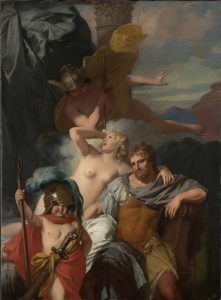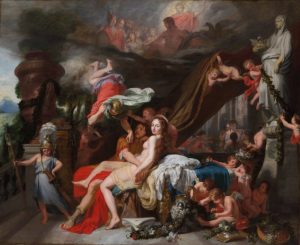28 Calypso Takes A Stand
Calypso Takes A Stand by Lauren Ziment
In the Odyssey, I felt that Calypso was not given the space to speak that she rightfully deserved. In Book 5, when Hermes comes to tell her that she must let Odysseus go, a direct order from Zeus, she begins to stand up for herself, but abruptly stops her point. She is silenced by the expectations and constraints of her gendered role as a goddess. Not only is Calypso silenced, but she is also hyper-sexualized in the narrative, further objectifying her and minimizing her autonomy. In the Homeric epochs, a clear gender hierarchy is established with gods at the top, followed by mortal men, followed by goddesses, and finally mortal women. In this hierarchy, though goddesses have the same ilk of power as the gods and are by far much stronger than the mortal men, gender roles push them down in the hierarchy, prioritizing the Greek patriarchy over sheer power. Because of this, we often see Greek goddesses in the narratives being silenced and controlled (except for Athena who is often ascribed masculine attributes and set apart from the other goddesses). In Calypso’s case, though she has a valid argument for why it is clearly hypocritical of the gods, especially Zeus, to ask her to forfeit her ownership of Odysseus, gender roles and expectations do not award her the agency to continue her argument and stand up for herself. In this scene, the ability to fully speak one’s mind with a valid argument is trumped by the gender hierarchy, something that is often seen throughout the epochs (even connecting to my last counter-narrative when Andromache is not given the space to stand up for what she believed in). Even the theme of ownership is gendered in the Homeric epochs. For men, ownership means taking a woman for sexual, subservient desires and having full ability to exploit whatever they want from her. In contrast, for women, as Calypso speaks to, ownership means caring for the man and seeking companionship with him. Though Calypso is technically taking “ownership” of Odysseus, she is still serving him by taking care of him and giving him a home. This contrast is really important to think about and why I thought that it was so important to write a narrative for Calypso. In my original narrative, instead of flipping the switch and immediately defaulting to subservience to Zeus, Calypso sticks to her guns and carries out the argument for why she should not have to let Odysseus go. She directly points out the hypocrisy and challenges Zeus directly, thus challenges the gender hierarchy of the Homeric epochs directly.
Book 5, Lines 117-145
“Calypso shuddered and let fly at him.
“You cruel, jealous gods! You bear a grudge
whenever any goddess takes a man
to sleep with as a lover in her bed.
Just so the gods who live at ease were angry
when rosy-fingered Dawn took up Orion,
and from her golden throne, chaste Artemis
attacked and killed him with her gentle arrows.
Demeter with the cornrows in her hair
indulged her own desire, and she made love
with Iasion in triple-furrowed fields—
till Zeus found out, hurled flashing flame and killed him.
So now, you male gods are upset with me
for living with a man. A man I saved!
Zeus pinned his ship and with his flash of lightning
smashed it to pieces. All his friends were killed
out on the wine-dark sea. This man alone,
clutching the keel, was swept by wind and wave,
and came here, to my home. I cared for him
and loved him, and I vowed to set him free
from time and death forever. Still, I know
no other god can change the will of Zeus.
So let him go, if that is Zeus’ order,
across the barren sea. I will not give
an escort for this trip across the water;
I have no ships or rowers. But I will
share what I know with him, and gladly give
useful advice so he can safely reach
his home.”
Counter Narrative:
“What hypocrites!
All the men take women for themselves,
But yet the second a woman takes ownership,
it has to be taken away from her.
How do you even begin to think that you have the right
to tell me to give up Odysseus and let him leave my island,
when you have done exactly the same thing before,
But worse!
Even mortal men are allowed to take women for themselves,
for their own mortal pleasures,
surely a goddess of higher power and standing should be able to do the same?
And you men see women for the taking, treat them as mere objects,
using them for your sexual desires.
But I have done nothing but care for Odysseus.
It was you, Zeus, who struck his ship,
brought pain and sorrow upon him as he watched his friends be swept away.
You caused him to be brought to my island, washed up on my shore.
In my ownership of him, I cared for him, gave him a home.
I don’t think any of you men could say the same for those you have taken.
It’s time somebody stood up, challenged the wishes of the mighty Zeus.
Stand up for those women who have come before me and done the same.
The all-powerful Zeus always sits upon his throne in Olympus,
having his will with the mortals,
having even greater will with the goddesses.
No longer must we be treated as second class.
Alas, Hermes, tell Zeus that I will no longer stand for this treatment.
I will not stand idly by, accepting that men can do what they will
while women are punished for the same actions.
While the one I love most is ripped from my grasps, taken from my island.
I will love Odysseus and care for him till the end of his time
and if anybody wishes to interfere, they will have to confront me head on.

“Mercy Ordering Calypso to Release Odysseus” Gerard de Lairesse, c. 1680

“Hermes Ordering Calypso to Release Odysseus” Gerard de Lairesse, c. 1670
